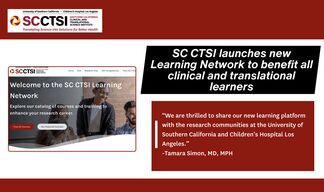SC CTSI Launches Expert Consulting Service to Help Investigators Recruit Study Participants
Finding qualified participants is one of the biggest hurdles for clinical studies. A new SC CTSI service provides expert consulting to help investigators enroll and retain qualified patients.
Clinical researchers know that the most promising and best-designed clinical study in the world won't prove much without the right participants. Unfortunately, it's not easy to find participants: some estimates show that 75 percent of investigators fail to meet their recruitment goals, while 90 percent fail to meet goals within their planned timeframe.
Put simply, the quality and speed of clinical and translational science largely depends on the success of participant recruitment.
"Recruitment is often a stumbling block for clinical studies, so we wanted to address it directly to help researchers conduct their studies more efficiently and effectively," said April Armstrong, MD, associate dean for clinical research at the Keck School of Medicine of USC and Director of Clinical Research Support at SC CTSI. "Far too many studies don't reach their recruitment goals and are forced to shut down before they start. This can be a huge loss of time, effort and research funding."
The good news is that the connected world of the internet, email, cell phones, Facebook and Twitter gives research coordinators more tools than ever to reach potential participants efficiently—if they know how to use them and how to communicate with their intended audience.
A recruitment roadmap for researchers
Accessing these tools just got a lot easier for researchers in the USC/CHLA research community, with establishment of a new research participant recruitment service by the SC CTSI. The service will provide resources to help study coordinators engage the participants they need. In particular, that help will come from patient recruitment specialists Nicki Karimipour, PhD, at USC, and Candice Mulder, MPH, CCRP, at CHLA.
For researchers who seek assistance, Karimipour and Mulder will develop a strategic recruitment plan tailored to the needs and challenges of the specific study. The plan would include topics such as poster/brochure design and content, how to create a website landing page for the study, use of advertising through traditional broadcast and print media, as well as outreach through digital and social media.
One size does not fit all
The recruitment plans would also address cultural issues and sensitivities relevant to the target population. Such considerations are increasingly pertinent: federal and institutional research authorities require inclusion of participants from all ethnic groups and other populations, the better to generate clinical and translational data that more accurately reflects the real world and benefits everyone. But studies show that minority populations are less likely to take part in clinical research.
That's a challenge the patient recruitment service will address directly, through consideration of the populations they're addressing. "Familiarity with cultural and linguistic factors can mean the difference between attracting participants or driving them away," said Karimipour. "It's not enough to simply translate a recruitment brochure word for word."
While virtually all clinical and translational scientists must deal with recruitment, investigators working with pediatric populations, such as those at Children's Hospital Los Angeles, may have an even tougher job. This is a positive thing: there are just fewer sick kids than sick adults, explained John C. Wood, MD, PhD, a principal investigator at The Saban Research Institute of CHLA and professor of Pediatrics and Radiology at the USC Viterbi School of Engineering, and Medical Director of the SC CTSI's Clinical Trials Unit.
But it also means the number of potential pediatric participants tends to be very small. If the research is addressing a rare disease, the pool can be tiny. "This is why it's imperative that researchers in pediatrics employ the strongest possible recruitment strategies," said Wood.
The recruitment service is open to all clinical investigators in the USC and CHLA research community. For more information, USC-based researchers can contact Nicki Karimipour at Nicki.Karimipour@med.usc.edu or 323-442-1280. CHLA researchers can contact Candice Mulder at cmulder@chla.usc.edu or 323-361-1547.



